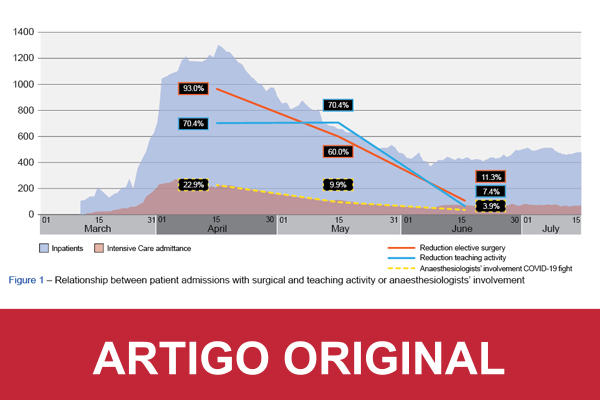SOCIAL MEDIA
Portuguese Medical Association's Scientific Journal

Introduction: The dissemination of the COVID-19 pandemic in Europe, namely in Portugal, demanded an organizational and clinical reaction from the Portuguese National Health Service. With the unpredictable impact of COVID-19 infected patients redefining hospital logistics, reducing non-priority elective care and extending the hospital capacity for critical care patients made mobilizing a significant part of human resources a priority. We conducted a national survey to monitor the contribution and the role of anaesthesiologists belonging to the 53 Portuguese National Health Service hospitals in the first wave fight against the pandemic.
Material and Methods: This prospective cross-sectional observational study used a weekly survey sent to the Directors of the Anaesthesiology Departments of all Portuguese National Health Service hospitals, between the period of 13th April and 21st June 2020. Directors were asked about human resources, hospital logistics, anaesthetic activity and residency programs in their departments as well as contingency plans facing the impact of the pandemic growth in the PNHS.
Results: Contingency strategy for all Portuguese National Health Service hospitals planned for a total of 1524 level III critical care beds during the initial phases of the pandemic, an increase of 151% from the existing 607 level III critical care beds in Portugal in January 2020. This re-configuration effort of the Portuguese National Health Service was only possible due to the partial or total suspension of non-urgent elective activity that reached over 90% of these institutions in the first pandemic months (March and April) and the deployment of anaesthesiologists from their normal activities to the treatment of critical care patients. During the peak of the first pandemic wave, 209 anaesthesiology specialists and 170 trainees (22.9% of the total anaesthesiologist’s staff in the Portuguese National Health Service) were deployed in critical care. There was an almost complete interruption of the residency program rotation in 70.4% of hospitals with anaesthesiology residents, between March and April 2020.
Conclusion: During the first pandemic wave there was an effective and fast reorganisation of the Portuguese National Health Service in order to increase level III critical care beds, which might have contributed to the low mortality rates in Portugal. We believe that this could have also been a result of the contribution given by all public anaesthesiology departments.